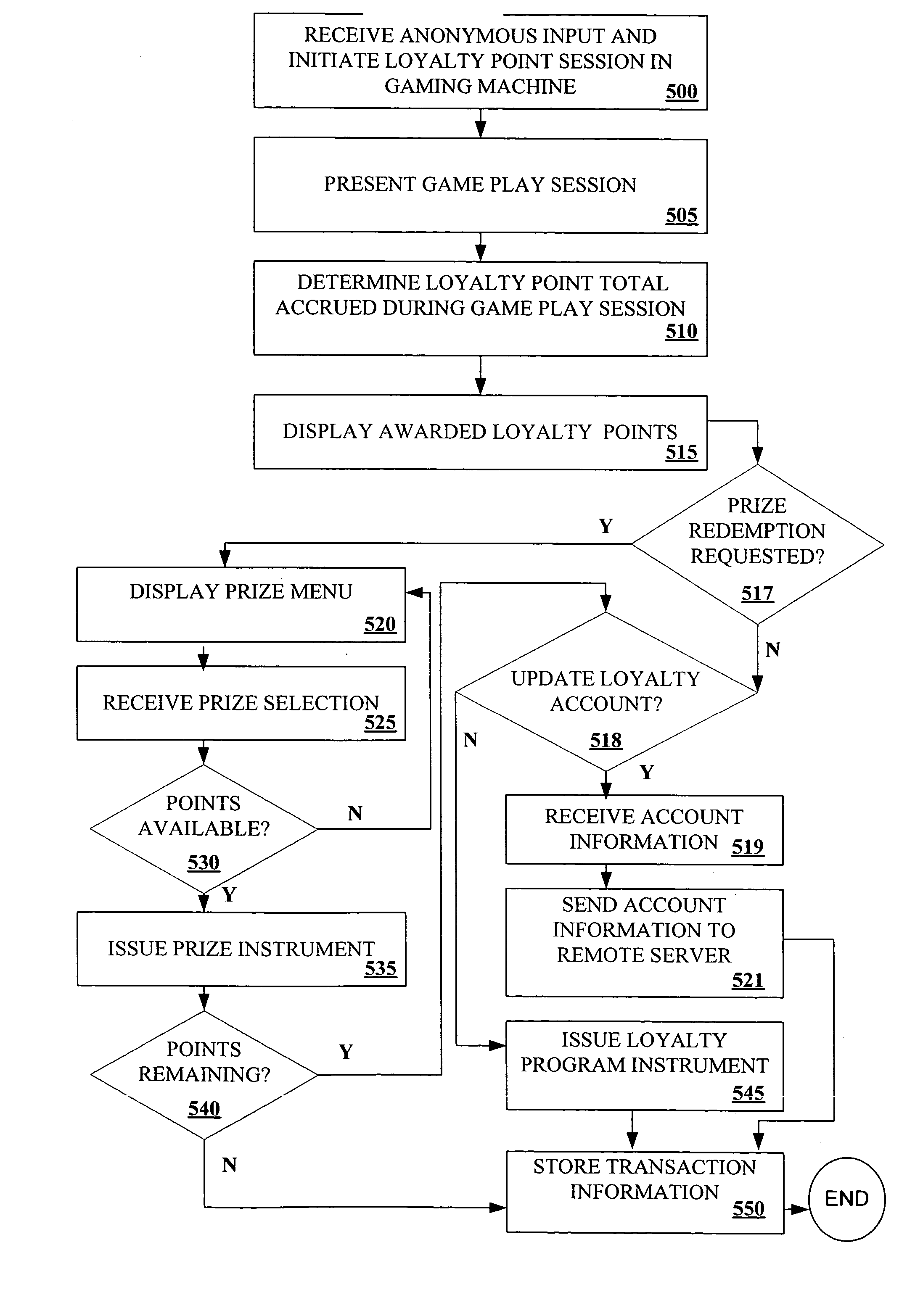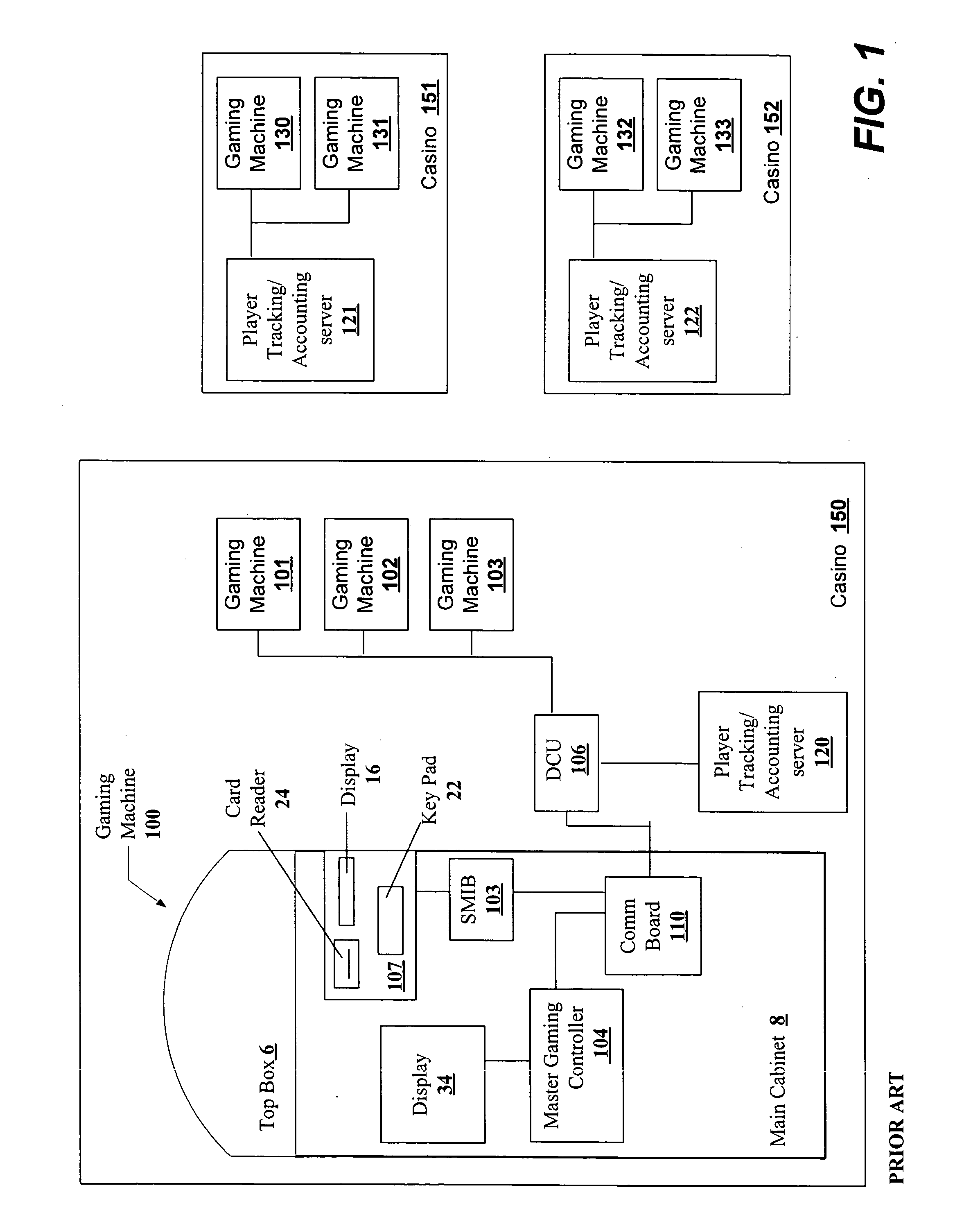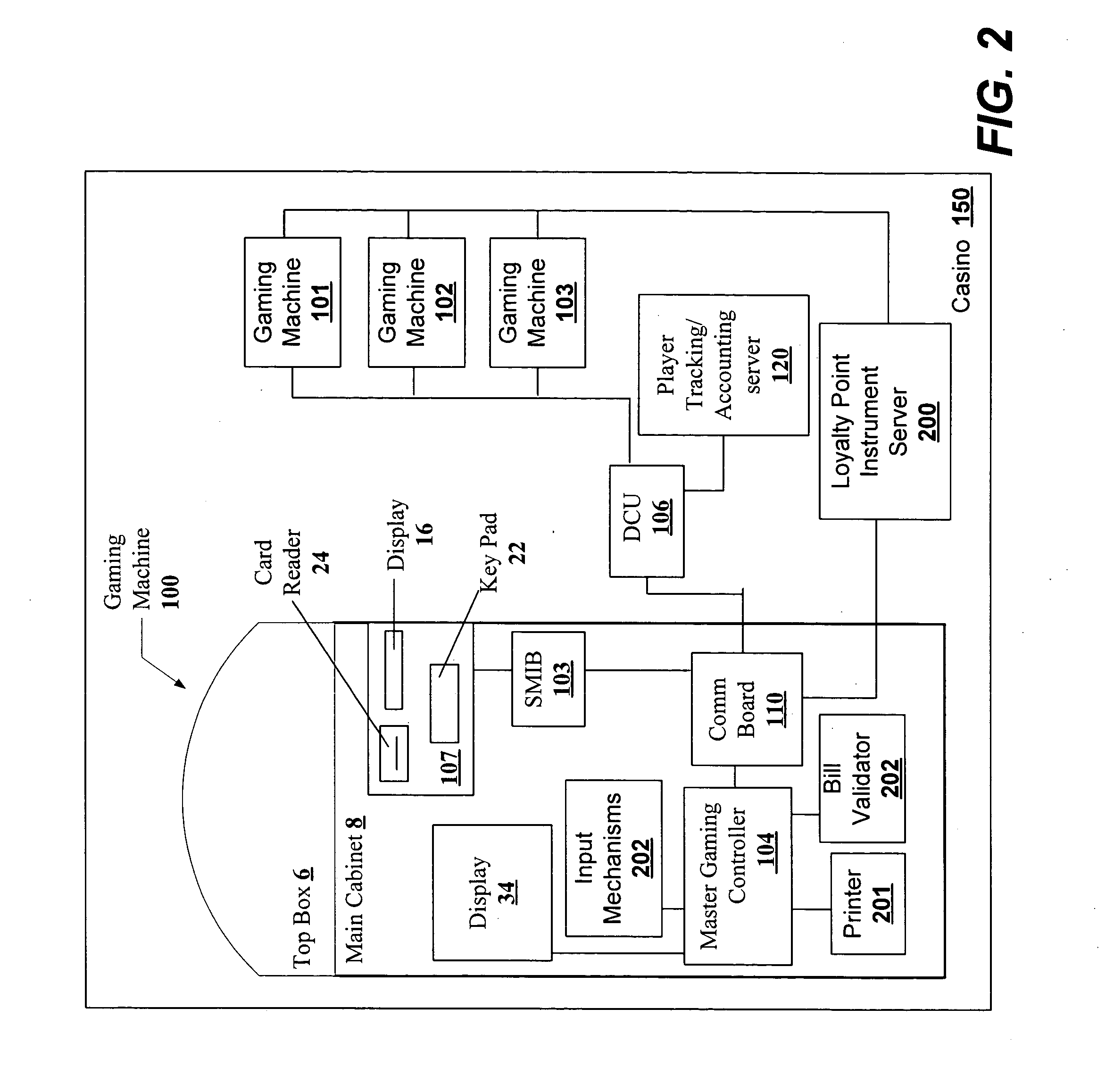It is an
advantage of the present invention to provide systems and methods for tracking patrons, differentiating patrons and awarding loyalty credits to patrons of a gaming establishment based upon the overall value of the patrons to the gaming establishment. This is accomplished by introducing methods and instrumentalities that facilitate the tracking and awarding of loyalty credits to patrons for both gaming activities and other purchasing activities associated with the gaming establishment. The resulting
system then permits the gaming establishment to create and maintain a theoretical all expenditures profile for each patron, whereby an overall value of each patron to the gaming establishment can be estimated. Patrons can then be comped and otherwise rewarded based at least in part on their theoretical all expenditures profiles.
to provide systems and methods for tracking patrons, differentiating patrons and awarding loyalty credits to patrons of a gaming establishment based upon the overall value of the patrons to the gaming establishment. This is accomplished by introducing methods and instrumentalities that facilitate the tracking and awarding of loyalty credits to patrons for both gaming activities and other purchasing activities associated with the gaming establishment. The resulting
system then permits the gaming establishment to create and maintain a theoretical all expenditures profile for each patron, whereby an overall value of each patron to the gaming establishment can be estimated. Patrons can then be comped and otherwise rewarded based at least in part on their theoretical all expenditures profiles.
One of the many advantages realized through the present invention is that the resulting
reward system is more comprehensive and thus has a greater tendency to generate loyalty and bring given patrons back to the gaming establishment. Another
advantage is that the gaming establishment is better able to track all expenditures of its patrons within the gaming establishment, and thus obtain more detailed information on the spending habits and preferences of each patron. This leads to another
advantage, in that the detailed information can then be used to tailor comps and rewards to individual tastes and preferences, such that patrons are generally happier and even more loyal to the gaming establishment, and are thus generally willing to spend and be rewarded and comped more on all purchases and activities across the gaming establishment.
According to one embodiment, the provided system and method involve the awarding of loyalty credits to patrons of a gaming establishment providing a loyalty credits program. Relevant steps in the process used by this embodiment include providing a first loyalty instrument adapted to facilitate the tracking of an amount of loyalty credits attributable to a patron of the gaming establishment, determining that a patron has begun a gaming activity for which loyalty credits are awarded, awarding the patron a first amount of loyalty credits corresponding to his or her participation in the gaming activity, storing this first amount of loyalty credits into an account assigned to the patron or onto the first loyalty instrument, determining that the patron has made a purchase for which loyalty credits are awarded, awarding the patron a second amount of loyalty credits corresponding to the purchase, combining the first amount of loyalty credits and second amount of loyalty credits into a combined amount of loyalty credits, and storing the combined amount of loyalty credits into an account assigned to the patron or onto a combined loyalty instrument adapted for tracking an amount of loyalty credits attributable to the patron. Of course, as in all embodiments disclosed herein, the gaming activity in the context of this application involves the placement of a wager by the patron, the play of a game, and the possibility of a monetary award to the patron based upon the outcome of the game. Further, the purchase involves the procurement of food, lodging, entertainment, transportation, merchandise or services, and the second amount of loyalty credits are in the same units as the first amount of loyalty credits. In addition, the gaming establishment is preferably the sole entity providing the loyalty credits program, and as such controls or authorizes the administration, distribution and redemption of substantially all of the loyalty credits and loyalty instruments.
Detailed versions of this embodiment of the present invention include providing loyalty instruments to the patrons, with examples of such loyalty instruments including smart cards, debit cards, magnetic striped cards, printed tickets, room keys and portable
wireless devices. In some instances, the first loyalty instrument and the combined loyalty instrument are the same physical item, with the only difference between the two being that the combined loyalty instrument has been adjusted to reflect the addition of the second amount of loyalty credits. In other instances, these instruments may involve different physical items, such as printed tickets or other devices that are
usable only once. In some instances, it may be possible to award loyalty credits without first receiving personal identification information from the patron or otherwise establishing the identity of the patron, regardless of whether the patron already has a loyalty credits account at the gaming establishment. Other detailed variations of this embodiment may include one or more features from one of the other particular embodiments that follow.
According to another particular embodiment, the provided system and method involves awarding customized comps to patrons of a gaming establishment. Relevant steps in the process used by this embodiment include determining that a patron has begun a gaming activity, tracking the participation of that patron in the gaming activity, assigning a first level of consideration to the patron corresponding to the amount of participation in the gaming activity, determining that the patron has made a purchase, tracking the amount of money spent by the patron on the purchase, assigning a second level of consideration to said patron corresponding to the amount of money spent by the patron on the purchase, and awarding a customized comp to the patron based on the first and second levels of consideration. In particular, the second level of consideration is independent of the first level of consideration, and the customized comp is awarded on the initiative of the gaming establishment and without any specific request from the patron for that comp. In detailed variations of this embodiment, various items and features from the foregoing and following particular embodiments may be incorporated, such as the awarding of loyalty credits for the gaming activity, purchase, or both.
 Login to View More
Login to View More  Login to View More
Login to View More 


